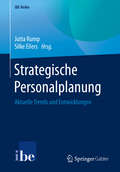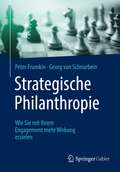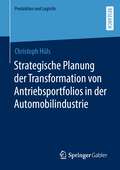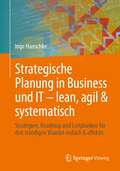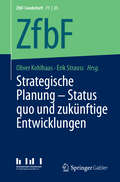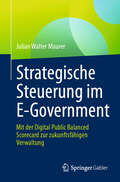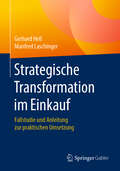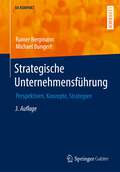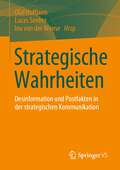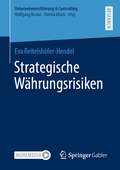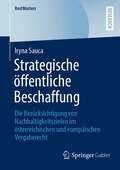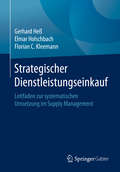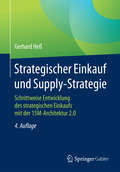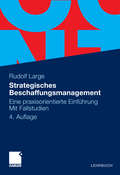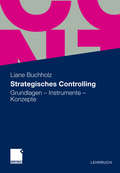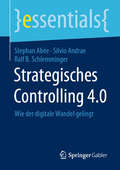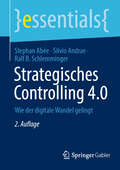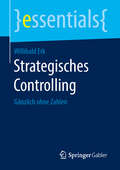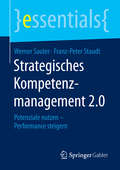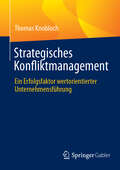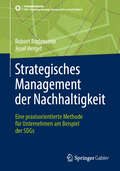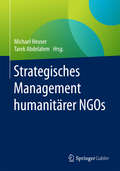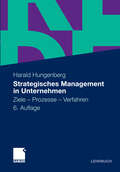- Table View
- List View
Strategische Personalentwicklung: Psychologische, pädagogische und betriebswirtschaftliche Kernthemen (Meet the Expert: Wissen aus erster Hand)
by Andrea Beinicke Tanja BippIn diesem Buch beantworten führende Expertinnen und Experten aus den Bereichen der Psychologie, Erwachsenenbildung und Betriebswirtschaftslehre praxisbezogene relevante Fragen zur Thematik der beruflichen Weiterbildung in der heutigen Arbeitswelt.Sie erfahren mehr zum Thema Personalentwicklung im Wandel der Zeit, verschiedene Weiterbildungssettings und wie Weiterbildungsserfolge sichergestellt werden können. Sie erhalten auch wissenschaftlich fundierte Erkenntnisse über Coaching und Mentoring und weitere Kernthemen wie:Wie wirkt sich die alternde Arbeitsgesellschaft auf die betriebliche Weiterbildung aus?Wie stellt man den Erfolg von Trainingsmaßnahmen im Arbeitsalltag sicher?Wie können Führungskräfte ihre Mitarbeitenden dazu befähigen, notwendige Kompetenzen für das heutige und zukünftige Arbeitsleben zu entwickeln?Ist Coaching von Mitarbeitern effektiv oder können negative Effekte auftreten?Dieses Buch richtet sich an Professionals aus der Praxis, die im Bereich Human Resource Development tätig sind wie Personalverantwortliche, Personalentwickler, Personalleiter sowie Mitarbeitende aus Weiterbildungseinrichtungen. Aber auch Studierende, Lehrende, und Wissenschaftler und alle, die Interesse haben, sich mit aktuellen und zukunftsweisenden Fragen der Personalentwicklung zu beschäftigen, sind zur Lektüre eingeladen.
Strategische Personalplanung: Aktuelle Trends und Entwicklungen (IBE-Reihe)
by Jutta Rump Silke EilersBekommen Sie praxisnahe Einblicke in die Hintergründe einer strategischen Personalplanung! Das Buch erläutert Schritt für Schritt die Herangehensweise, geht auf die besondere Rolle der Betriebs- und Personalräte ein und setzt strategische Personalplanung in den Kontext langfristiger Trends und aktueller Entwicklungen wie der Corona-Krise. Anschaulich wird von den Autoren unterschiedlicher Unternehmen praxisnah und fundiert aufgezeigt, wie es in öffentlichen Verwaltungen ebenso wie in privatwirtschaftlichen Unternehmen gelingen kann, strategisch Personal zu planen. Finden Sie hier die wichtigsten inhaltlichen Schwerpunkte des Buches!Strategische Personalplanung im Kontext langfristiger Trends und aktueller Entwicklungen.Praxisbeispiele aus Wirtschaft und öffentlicher Verwaltung zur Umsetzung einer strategischen Personalplanung.Schritt-für-Schritt-Anleitung zur strategischen Personalplanung.
Strategische Philanthropie: Wie Sie mit Ihrem Engagement mehr Wirkung erzielen
by Peter Frumkin Georg von SchnurbeinVor dem Hintergrund globaler Herausforderungen an den Finanzmärkten und beschränkte öffentlicher Haushaltsbudgets ist die Fähigkeit von privater Philanthropie, Lücken zu füllen, von besonderer Bedeutung. Unterstützung für gesellschaftliche Probleme, die Finanzierung innovativer Projekte oder die Entwicklung alternativer Angebote bieten vielfältige Möglichkeiten, sich für die Gesellschaft zu engagieren. Aber wie können Philanthropen und Spender Gewissheit haben, dass ihre Beiträge auch eine Wirkung erzielen? Wie können Fundraiser überzeugend und nachvollziehbar ihr Projekt präsentieren? Dieses Buch bietet allen in der Philanthropie involvierten Akteuren - von Philanthropen über Fundraisier bis hin zu Nonprofit Managern - einen praktischen und kompakten Leitfaden zur wirkungsorientierten Umsetzung. Die Autoren definieren fünf Herausforderungen, die zu berücksichtigen sind, wenn ein Engagement mehr als eine flüchtige Spende sein soll. Dazu zählen der zeitliche Umfang des Engagements, die Formulierung der erwünschten Wirkung und die Übereinstimmung der Spende mit der eigenen Identität und dem eigenen Stil des Gebenden. Die Berücksichtigung dieser grundsätzlichen, strategischen Aspekte des Gebens erlaubt es Philanthropen, ihre Ziele effektiver zu erreichen - und eine dauerhafte Beziehung mit den unterstützten Institutionen und Destinatären aufzubauen. Gerade für die nächste Generation von Philanthropen, die vor der Herausforderung stehen, effektiv zu verteilen, was Andrew Carnegie den “Überschuss-Reichtum" genannt hat, ist dieses Buch eine unverzichtbare Anleitung mit praktischen Fallbeispielen, Empfehlungen und Methoden.
Strategische Planung der Transformation von Antriebsportfolios in der Automobilindustrie (Produktion und Logistik)
by Christoph HülsDie Regulierung von CO2-Flottenemissionen sowie selbstgesteckte Ziele zur Reduzierung von CO2-Emissionen erzwingen die Transformation von Antriebsportfolios in der Automobilindustrie. Christoph Hüls entwickelt ein Optimierungsmodell zur Identifizierung finanziell vorteilhafter Projektportfolio-Entscheidungen von Automobilherstellern unter Einbeziehungen von Grenzwerten zu CO2-Flottenemissionen. Das Potential des entwickelten Modells wird im Rahmen einer beispielhaften Anwendung auf Fragestellungen in Bezug zur strategischen Planung der Transformation von Antriebsportfolios aufgezeigt.
Strategische Planung in Business und IT – lean, agil & systematisch: Strategien, Roadmap und Leitplanken für den ständigen Wandel einfach & effektiv
by Inge HanschkeMit diesem Buch erhalten Sie kompaktes Wissen zur Ausrichtung der IT an den Geschäftserfordernissen:- Geschäftstreiber verstehen und nachvollziehbar dokumentieren- Systematisch Anforderungen an die IT ableitenMit dem Ziel-Bild vor Augen und der Roadmap für die Umsetzung gestalten Sie die digitale Transformation – vom Business bis zur technischen Umsetzung. Schaffen Sie so die organisatorischen Voraussetzungen für die strategische IT-Planung. Dashboards und KPIs zur wirksamen Steuerung der Umsetzung der Planung sind dabei wichtige Hilfsmittel. Ein Schritt-für-Schritt-Leitfaden und ein ausführliches Glossar unter-stützen Sie bei Ihrer Arbeit.
Strategische Planung – Status quo und zukünftige Entwicklungen (ZfbF-Sonderheft #77 / 23)
by Erik Strauss Oliver KohlhaasDieser Band anlässlich des 50-jährigen Bestehens des Arbeitskreises für Integrierte Unternehmensplanung thematisiert einige der aktuellsten Fragestellungen im Zuge einer hochprofessionellen und zukunftssicheren strategische Planung im Unternehmen. Die sechs Beiträge von renommierten WissenschaftlerInnen und erfahrenen Praktikern fokussieren sowohl bereits praktizierte Ansätze als auch Zukunftsszenarien für erfolgreiche strategische Planungsarbeiten in Unternehmen. Dabei werden Fragen der fortschreitenden Digitalisierung, der nachhaltigen Entwicklung und auch der Herausforderungen eine VUCA Welt aufgegriffen. Außerdem werden die Schnittstellen der strategischen Planung und der operativen Umsetzung beleuchtet. Zukunftsweisen Plannungstools und -methoden werden vorgestellt.
Strategische Steuerung im E-Government: Mit der Digital Public Balanced Scorecard zur zukunftsfähigen Verwaltung
by Julian Walter MaurerDieses Buch behandelt die Grundlagen der Verwaltungsdigitalisierung sowie des strategischen Managements und Controllings aus Perspektive der öffentlichen Verwaltung. Die digitale Transformation stellt den modernen Staat vor enorme Herausforderungen: von der Umsetzung und zuletzt Neugestaltung des Onlinezugangsgesetzes bis hin zur strategischen Koordination von Digitalisierungsprojekten auf Bundes-, Landes- und kommunaler Ebene. Dabei stellt sich insbesondere die Frage, wie digitale Transformationsprozesse effizienter gesteuert, strategisch ausgerichtet und nachhaltig umgesetzt werden können, um den Weg zu einer zukunftsfähigen Verwaltung zu ebnen. Julian Walter Maurer beleuchtet die theoretischen Grundlagen der Verwaltungsdigitalisierung und des strategischen Controllings und ordnet zunächst die Balanced Scorecard (BSC) als bewährtes betriebswirtschaftliches Steuerungsinstrument ein. Er zeigt auf, wie die BSC eingesetzt werden kann, um Ziele zu definieren, Maßnahmen vorgabenorientiert zu erarbeiten und umzusetzen sowie Erfolge messbar zu machen. Mit der Digital Public Balanced Scorecard (DPBSC) wird ein praxisnahes Steuerungskonzept vorgestellt, welches die klassische BSC weiterdenkt – angepasst an die besonderen Anforderungen des öffentlichen Sektors im digitalen Wandel sowie ebenen- und strukturübergreifend flexibel einsetzbar. Drei anschauliche Fallstudien demonstrieren, wie die DPBSC dabei behilflich sein kann, Verwaltungsmodernisierung konkret, integriert und messbar zu gestalten. Mit Fokus auf aktuelle rechtliche und strategische Entwicklungen und einem interdisziplinären Ansatz liefert der Autor ein fundiertes Werkzeug für die strategische Steuerung im öffentlichen Sektor. Für Führungskräfte in der Verwaltung, Digitalisierungsbeauftragte, politische Entscheider, Wissenschaftler sowie alle, die die Verwaltung strategisch weiterdenken wollen. Der Inhalt Digitalisierung der öffentlichen Verwaltung in Deutschland Rechtliche und strategische Grundlagen der Verwaltungsdigitalisierung Strategisches Management und Controlling im Kontext der Digitalisierung und öffentlichen Verwaltung BSC als Instrument des strategischen Controllings BSC im Kontext klassischer und moderner Steuerungsansätze Digital Public Balanced Scorecard (DPBSC) Beispiele der DPBSC im E-Government
Strategische Transformation im Einkauf: Fallstudie und Anleitung zur praktischen Umsetzung
by Gerhard Heß Manfred LaschingerIn diesem Buch wird die strategische Transformation im Einkauf ausführlich an einem realen Fallbeispiel beschrieben. Dazu wird die Vorgehensweise über fünf Jahre nachgezeichnet und wie sich der Einkauf schrittweise aus einer weitgehend abwickelnden Position zum geschätzten Business Partner entwickelt hat. Im Ergebnis ist der Einkauf auf Augenhöhe in alle relevanten Unternehmensprozesse und in die Formulierung der Unternehmensstrategie integriert. Im zweiten Teil wird ein Leitfaden für die Einkaufspraxis zur strategischen Transformation des Einkaufs mit den drei Erfolgskonzepten vorgestellt: Ganzheitliche Strategie, Evolutionäre Entwicklung und Change Management. Die eingesetzten Methoden, Instrumente und Prozesse werden detailliert dargestellt, beispielsweise zur Entwicklung von Warengruppenstrategien, zur Lieferantenklassifizierung und Lieferantenstrategie sowie zur Mitarbeiterentwicklung. Basiskonzept der strategischen Transformation im Einkauf ist die 15M-Architektur der Supply-Strategie – ein systematischer, ganzheitlicher Ansatz zur Formulierung von Supply-Strategien und zur Entwicklung des strategischen Einkaufs.
Strategische Unternehmensführung: Perspektiven, Konzepte, Strategien (BA KOMPAKT)
by Rainer Bergmann Michael BungertDieses Lehrbuch vermittelt einen umfassenden Überblick über die zentralen Ansätze des strategischen Managements von Unternehmen. Kompakt, anschaulich und praxisrelevant stellen die Autoren das Wesen, die zentralen theoretischen Ansätze und die Gestaltungsaspekte der strategischen Unternehmensführung dar. Diese reichen von der Strukturierung der Unternehmensziele, der Strategie der Marktsegmentierung und Geschäftsmodellkonzeption, über ressourcen-, wert- und wachstumsorientierte Unternehmensführung hin zu Wettbewerbsanalyse und -strategie, strategischen Planungstechniken und dem Management des Wandels. Fallstudien, Praxisbeispiele und Kontrollfragen zu jedem Themenbereich regen die Diskussion im Anwendungszusammenhang an und zeigen den Lesern neue Perspektiven der strategischen Unternehmensführung auf. Das Buch deckt diejenigen Anforderungen ab, die für das Modul „Unternehmensführung“ in der Hochschullehre gestellt werden. Es richtet sich an Studierende und Dozenten von Dualen Hochschulen, Fachhochschulen und Universitäten sowohl betriebswirtschaftlicher, technischer als auch sozialwissenschaftlicher Bachelor-Studiengänge.Die dritte Auflage wurde um diverse strategietheoretische Konzepte ergänzt (u. a. „Geschäfts-modelle“ und „Disruption“, „Blue Ocean Strategy“ und „Non-Market Strategy“); die Ausführungen zur Spieltheorie, zur Unternehmenskultur, zur wertorientierten Unternehmensführung und zur Charta des Managements von Veränderungen wurden erweitert. Darüber hinaus sind weitere Praxisbeispiele aufgeführt bzw. aktualisiert.
Strategische Wahrheiten: Desinformation und Postfakten in der strategischen Kommunikation
by Olaf Hoffjann Lucas Seeber Ina von der WenseStrategische Kommunikation zielt mit ihren kontingenten Wirklichkeitsbeschreibungen seit jeher auf gesellschaftliche Wahrheitsmodelle. Wie häufig gesellschaftliche Wahrheitsmodelle auf strategische Kommunikationsbemühungen zurückgehen, auf Unwahrhaftigkeit beruhen und damit zumindest zeitweise zu strategischen Wahrheiten werden, zeigen eindrucksvoll zwischenzeitlich geglaubte Wahrheiten, die sich als Lüge entpuppt haben: von Walter Ulbrichts „Niemand hat die Absicht, eine Mauer zu errichten“ über Hitlers Tagebücher bis hin zu den Massenvernichtungswaffen im Irak. Die erfolgreichen Kampagnen der Brexiteers und von Donald Trump 2016 haben diesem Thema zu neuer und bislang ungeahnter Aufmerksamkeit verholfen. Während die Themen Desinformation und postfaktische Gesellschaft die Journalismus-, politische Kommunikations- und Medienethikforschung aktuell zu dominieren scheinen, ist das Schweigen der deutschsprachigen und internationalen PR- und Organisationskommunikationsforschung auffällig. Dies ist umso bemerkenswerter, weil die PR-Wissenschaft in der Vergangenheit immer wieder versucht hat, ihren Gegenstand zu schärfen, indem sie sich am Begriff der Propaganda abgearbeitet hat. Daraus müsste eigentlich eine Affinität für das Thema Desinformation resultieren. Aber genau das Gegenteil ist offensichtlich der Fall: Hat sich die PR-Wissenschaft gerade deshalb nicht mit Desinformation beschäftigt, weil sie sich so dezidiert von Propaganda und darin eingeschlossenen desinformierenden und manipulativen Techniken abgrenzen will? Was sind die Gründe hierfür? Glauben wir, bereits alles zum Thema gesagt zu haben? Liegt dies daran, dass sich die PR- und Organisationskommunikationsforschung seit jeher vor allem für Unternehmen und weniger für politische und Non-Profit-Organisationen interessiert? Oder fühlen wir uns hier schlicht und ergreifend nicht zuständig? Es scheint offenkundig höchste Zeit zu sein, sich wieder eingehend mit Fragen der Desinformation aus der Perspektive der strategischen Kommunikationsforschung zu befassen. Die Beiträge des Tagungsbandes fokussieren hierzu auf neue theoretische Perspektiven, normative Bewertungen und empirische Befunde.
Strategische Währungsrisiken (Unternehmensführung & Controlling)
by Eva Reitelshöfer-HendelDie Steuerung strategischer Währungsrisiken schien lange Zeit ein nur schwer zu handhabendes Problem für Unternehmen zu sein. Zu viele Informationen und Daten müssen aus unterschiedlichen Unternehmensbereichen gesammelt, verdichtet und interpretiert werden, um das entstehende Risiko abzuschätzen. Die heute zur Verfügung stehenden großen Datenmengen und die immer weiter voranschreitenden Entwicklungen in der Auswertung und Analyse (Business Analytics) tragen dazu bei, dass diese Defizite behoben werden können. Die Arbeit widmet sich der Untersuchung, in wie fern die Nutzung von Business Analytics im Controlling zu einer Steuerung des strategischen Währungsrisikos beitragen kann.
Strategische öffentliche Beschaffung: Die Berücksichtigung von Nachhaltigkeitszielen im österreichischen und europäischen Vergaberecht (BestMasters)
by Iryna SaucaDie Auswirkungen des Klimawandels und soziale Missstände sind immer stärker spürbar. Die Europäische Union und die Mitgliedsstaaten sehen sich daher dringender denn je mit der Frage konfrontiert, welche Maßnahmen dagegen ergriffen werden können. Das Vergaberecht kann dabei eine wichtige Rolle spielen, da es durch die Berücksichtigung strategischer Beschaffungszwecke die Einbeziehung von gesellschaftspolitischen Zielen bei der öffentlichen Auftragsvergabe ermöglicht. In dem vorliegenden Buch wird daher die Entwicklung der strategischen öffentlichen Beschaffung auf europäischer und österreichischer Ebene untersucht. Dabei werden deren Potenziale und rechtliche Grenzen aufgezeigt.
Strategischer Dienstleistungseinkauf: Leitfaden zur systematischen Umsetzung im Supply Management
by Gerhard Heß Florian C. Kleemann Elmar HolschbachDieses Buch stellt der Einkaufspraxis einen systematischen Handlungsleitfaden zur Formulierung und Implementierung von Strategien im Dienstleistungseinkauf zur Verfügung. Für die strategische Ausrichtung des Supply Managements in der Beschaffung von Dienstleistungen und Services bildet die 15M-Architektur den strukturellen Rahmen. Entsprechend werden Dienstleistungen innerhalb der Rahmenstrategie des Einkaufs positioniert. Auf dieser Basis können Marktstrategien für wichtige Dienstleistungskategorien und Lieferanten- bzw. Dienstleisterstrategien formuliert sowie die Beschaffungsprozesse ausgerichtet werden. Abschließend wird das Einkaufscontrolling mit der Entwicklung von dienstleistungsspezifischen Zielgrößen und Kennzahlen beschrieben. Das Buch hilft Einkäufern dabei, mit den besonderen Herausforderungen bei der Beschaffung von industriellen Dienstleistungen und Services besser umgehen zu können.
Strategischer Einkauf und Supply-Strategie
by Gerhard HeßIn diesem Buch wird mit der 15M-Architektur ein Konzept zur Formulierung und Umsetzung von Supply-Strategien vorgestellt. Damit wird der strategische Einkauf gleichzeitig auch schrittweise zum wirklich strategischen Einkauf entwickelt. Die 15M-Architektur ist in der Unternehmenspraxis in Zusammenarbeit mit Unternehmen unterschiedlicher Größe entstanden. Nach zehn Jahren erfolgreichem Praxiseinsatz werden die Erfahrungen in der neuen Version 2.0 der 15M-Architektur gebündelt. Sie ist geschäftsarten-, branchen- und sektorenunabhängig, d. h. gleichermaßen für Industrie, Dienstleistung und Handel geeignet. Zwei ausführliche Fallbeispiele und ein Glossar ergänzen die Ausführungen.
Strategischer Wettbewerb im Weltraum: Politik, Recht, Sicherheit und Wirtschaft im All (Sicherheit, Strategie & Innovation)
by Enrico Fels Antje Nötzold Andrea Rotter Moritz BrakeDer Sammelband nimmt erstmalig seit Ende des Kalten Krieges für den deutschsprachigen Raum eine komprimierte Bestandsaufnahme der aktuellen Aktivitäten, rechtlichen Rahmenbedingungen, politischen und militärischen Konfliktlinien und Kooperationsräume sowie weiterführender Trends und Herausforderungen im Weltraum vor. Dabei werden zum einen die rechtlichen, militärischen, wirtschaftlichen und technologischen Herausforderungen des Bedeutungszuwachses dieses strategisch gewichtigen Raumes analysiert. Zum anderen werden Handlungsfähigkeit und -bedarf ausgewählter Weltraummächte, ihre Kooperationsmöglichkeiten und Konfliktpotenziale sowie der internationale politische Regulierungsbedarf herausgearbeitet und darauf aufbauend politische Handlungsempfehlungen dargelegt.„Eine hervorragend gelungene Bestandsaufnahme der umfassenden Bedeutung des Weltraums.“ Prof. Dr. Dr. h. c. Karl Kaiser, Harvard University
Strategisches Beschaffungsmanagement
by Rudolf LargeDas Lehrbuch gliedert sich in abgeschlossene, aber inhaltlich zusammenhängende Lerneinheiten. Für jede Lerneinheit sind die Lernziele klar definiert. Mit ausführlichen Fallstudien kann der Lernerfolg anwendungsorientiert überprüft werden.
Strategisches Controlling
by Liane BuchholzDieses neue Lehrbuch ordnet das strategische Controlling in den Kontext des allgemeinen Controllings und der Unternehmensführung ein. Liane Buchholz gibt einen systematischen Überblick über alle wichtigen strategischen Controllinginstrumente. Dazu werden strategische Vorsteuergrößen und -ebenen definiert, die eine genaue Klassifizierung der Controllinginstrumente ermöglichen. Darüber hinaus stellt die Autorin strategische Konzepte und deren Anforderungsprofile an das strategische Controlling vor und zeigt den Transfer der Strategie in die operative Praxis der Unternehmen.
Strategisches Controlling 4.0: Wie der digitale Wandel gelingt (essentials)
by Stephan Abée Silvio Andrae Ralf B. SchlemmingerDie Digitalisierung verändert nachhaltig Wertschöpfungsketten in Unternehmen oder sogar ganze Geschäftsmodelle. Diese Entwicklungen bleiben nicht ohne Auswirkungen auf die Unternehmenssteuerung und damit auch auf das Controlling. Das Buch stellt eine Systematik vor, wie die Digitalisierung das strategische Controlling in Unternehmen verändert und welche Entwicklungspfade hin zu einem „Strategischen Controlling 4.0“ führen.
Strategisches Controlling 4.0: Wie der digitale Wandel gelingt (essentials)
by Stephan Abée Silvio Andrae Ralf B. SchlemmingerDie Digitalisierung verändert Wertschöpfungsketten in Unternehmen grundlegend und beeinflusst in vielen Fällen sogar komplette Geschäftsmodelle. Diese Entwicklungen haben auch erhebliche Auswirkungen auf die Unternehmenssteuerung und damit auch auf das Controlling. Das Buch präsentiert eine Systematik, die zeigt, wie das strategische Controlling die Chancen der Digitalisierung nutzen kann, und beschreibt die Entwicklungspfade hin zu einem „Strategischen Controlling 4.0".
Strategisches Controlling: Gänzlich Ohne Zahlen (Essentials)
by Willibald ErkWillibald Erk geht in diesem essential alle Verantwortungsbereiche eines Unternehmens systematisch an, um sie zu optimieren bzw. neu auszurichten, mit dem Ziel nachhaltiger Geschäftserfolge. Anders als beim herkömmlichen Controlling stehen Lösungen und Handlungen im Vordergrund, nicht die betriebswirtschaftlichen Kennzahlen. Außerdem wird dreifach auf die Menschen fokussiert: als begeisterte Kunden, als motivierte Mitarbeiter und als innovationsoffene Firmeninhaber. Nur deren Zusammenwirken erreicht die erforderlichen Geschäftsergebnisse und kann diese dauerhaft sichern.
Strategisches Kompetenzmanagement 2.0: Potenziale nutzen – Performance steigern (essentials)
by Werner Sauter Franz-Peter StaudtDie Autoren formulieren Anforderungen an ein strategisches Kompetenzmanagement und beschreiben die Konzeption dieses Systems zur Steigerung der Perfomance des Unternehmens. Sie erläutern die Entwicklung von strategieorientierten Kompetenzmodellen in der Praxis und die Steuerung der Kompetenzentwicklungsprozesse im gesamten Unternehmen. Damit ist gewährleistet, dass Unternehmen zukünftig notwendige Kompetenzen und Ressourcen für die Zielerreichung und Performancesteigerung zur Verfügung stehen.
Strategisches Konfliktmanagement: Ein Erfolgsfaktor wertorientierter Unternehmensführung
by Thomas KnoblochDieses Buch nimmt Konflikte als Unternehmensrisiken in den Blick, ausgehend von den Unternehmenszielen sowie einer chancen- und risikoorientierten Unternehmensführung. Es stellt die Entwicklungsstufen des Konfliktmanagements dar, die über funktionale Basisstrukturen zu strategischen Konfliktmanagementsystemen führen. Der Autor entwickelt einen Integrationsansatz zur Verschränkung von Konflikt- und Risikomanagement und zeigt Schnittstellen zur Nachhaltigkeits- und New Work-Politik der Unternehmen auf. Zielgruppen sind Vorstände, Geschäftsführungen, Führungskräfte und Mitglieder von Aufsichtsgremien, die gemeinsam Verantwortung für die Corporate Governance-Performance ihrer Unternehmen tragen, sowie wirtschaftsberatende Berufe.
Strategisches Management der Nachhaltigkeit: Eine praxisorientierte Methode für Unternehmen am Beispiel der SDGs (SDG - Forschung, Konzepte, Lösungsansätze zur Nachhaltigkeit)
by Josef Herget Robert BodensteinDieses Buch setzt sich mit der konkreten Umsetzung von Nachhaltigkeitsstrategien in Unternehmen auseinander. Damit die Strategie wirkungsvoll umgesetzt werden kann, wurde eine modellbasierte Methode entwickelt, die einen ganzheitlichen Ansatz ermöglicht, ohne dass die Komplexität den Blick für das Wesentliche verstellt. Das vorgeschlagene Konzept der Nachhaltigkeits-Exzellenz stellt eine Vorgehensweise zur Verfügung, die sowohl Herausforderungen in großen Unternehmen als auch begrenzte Ressourcen in kleinen Unternehmen berücksichtigt. Die entwickelte Methode eignet sich für alle gewählten Konzepte zur Nachhaltigkeit. Die praktische Umsetzung der vorgestellten Methode wird am Beispiel der Sustainable Development Goals (SDGs) der Vereinten Nationen (UN) konkret dargestellt. Die Integration der Nachhaltigkeitsstrategie in die Unternehmenskultur erhält eine besondere Betrachtung. Abgerundet wird das Werk mit zahlreichen Checklisten sowie Hintergrundinformationen zu Chancen und Risiken des Managements von Nachhaltigkeit in Unternehmen. Das Buch richtet sich an Manager, Eigentümer, Berater und alle, die an Strategien zur Nachhaltigkeit in Unternehmen interessiert sind.
Strategisches Management humanitärer NGOs
by Michael Heuser Tarek AbdelalemDieses Buch schildert die zunehmende Professionalisierung humanitärer Nichtregierungsorganisationen (NRO) in Deutschland. Es zeigt auf, wie sich kraftvolle Überzeugungen und moderne Unternehmensführung, wie sich Mission und Management zu wirkungsvollem und erfolgreichem Handeln – gerade und vor allem in humanitären Krisen und Katastrophen – verbinden.Die Autorinnen und Autoren stehen durchwegs für ein modernes NRO-Verständnis. Sie kommen selbst aus deren Top-Management oder begleiten es eng als Berater, in Ministerien, durch politische und durch Verbandsarbeit. Ihre Beiträge verbinden sich – durchaus auch kritisch und selbstkritisch – zu einem aktuellen Gesamtbild des Strategischen Managements humanitärer NGOs.Das Buch ist sowohl für Führungskräfte und Mitarbeiter Unternehmen und Organisationen, die nach Anregungen und Impulsen für eine schlagkräftige Verknüpfung von Mission und Management suchen als auch für Führungskräfte und Mitarbeiter in Verwaltungen, die mit humanitären NRO zusammenarbeiten und deren Zusammenspiel aus tief verwurzelter Überzeugung und Professionalität besser verstehen wollen und Führungskräfte, Mitarbeiter und Organisationen des NRO-Sektors selbst, die von den Erfahrungen anderer lernen wollen.
Strategisches Management in Unternehmen: Ziele - Prozesse - Verfahren
by Harald HungenbergStrategische Entscheidungen prägen die langfristige Entwicklung eines Unternehmens. Sie werden gerade in der heutigen Zeit eines intensiver werdenden Wettbewerbs immer wichtiger. Das Lehrbuch "Strategisches Management in Unternehmen" setzt sich umfassend und praxisorientiert mit strategischen Entscheidungen auseinander und gibt einen Überblick über die Theorien, Konzepte und Instrumente des strategischen Managements auf Geschäftsfeld- und Unternehmensebene. Es zeigt, wie Erfolg versprechende Strategien formuliert und umgesetzt werden können. Die übersichtliche Struktur des Buchs erleichtert den Zugang zum Thema, viele praktische Beispiele und Erläuterungen fördern das Verständnis. Die sechste Auflage ist wiederum überarbeitet und auf den neuesten Stand gebracht. Dabei werden insbesondere die dynamische Betrachtung von Strategien weiter ausgebaut und neuere Instrumente diskutiert.

